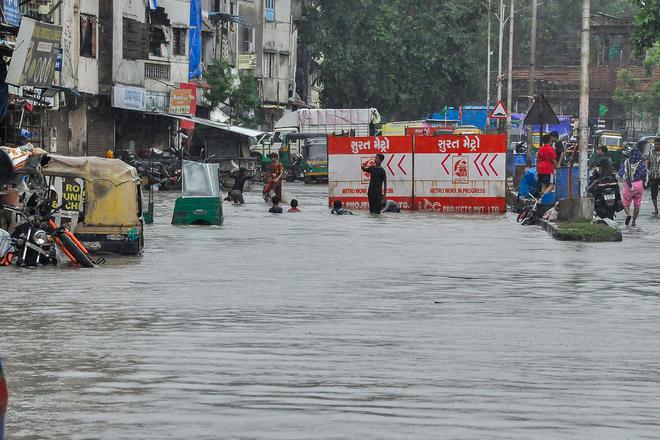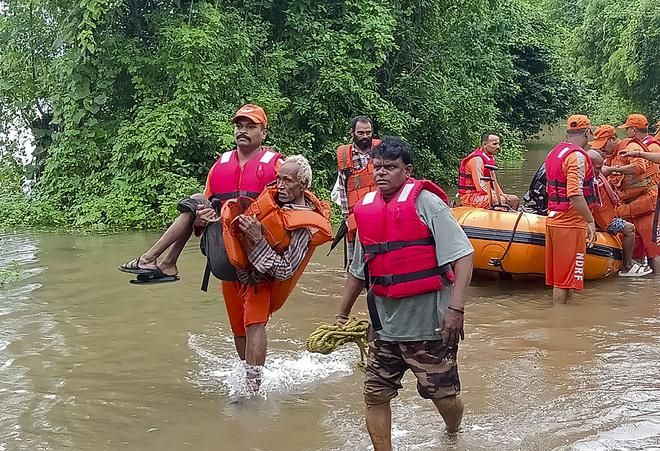Over 600 people stranded in flood waters were rescued and almost 12,000 people were shifted to shelters and safer locations amidst heavy rains lashing Gujarat and creating flood-like situations in several districts of the State on September 18.
Owing to incessant rains, Narmada dam and nine other reservoirs continued to overflow for the second day on Monday, prompting the state authorities to deploy the NDRF teams and shift the people from vulnerable areas to safer locations.
In a press release; the government said that approximately 11,900 people from low-lying areas of districts including Vadodara, Bharuch, Narmada, Dahod, Panchmahal, Anand and Gandhinagar have shifted to safe shelters, where their food and health-related services are also being taken care of.
The Chief Minister said in a release said that he is in coordination with the district collectors of the respective districts affected by heavy rains and presently 10 contingents of both NDRF and SDRF have are deployed in rescue operations at various places.
According to the Indian Meteorological Department (IMD), heavy to extremely heavy rainfall is expected in parts of Gujarat.
On September 18, the heavy rains battered parts of central, north and Saurashtra regions as more than 100 talukas recorded heavy rainfall since September 17.

Meanwhile, politics over the release of Narmada waters from Sardar Sridhar dam that led to floods in Nardana, Bharuch and parts of Vadodara district, intensified after the opposition Congress and the Aam Aadmi Party (AAP) accused the Gujarat government of delayed releasing of the waters to coincide with the Prime Minister’s birthday on September 17.
On September 18, the Congress and the AAP held that the State government refused to release the dam’s waters when farmers needed it but, instead, stored it so that the reservoir overflowed.
The principal Opposition party called it a “man-made disaster”, and alleged that the sudden release of waters first caused a flood in downstream Bharuch district and resulted in “large-scale damage” affecting “lakhs of people” in Narmada, Bharuch and Vadodara districts.
Congress spokesperson Manish Doshi told media persons that “Despite heavy rains in Madhya Pradesh and hourly monitoring of water levels in Narmada dam, the authorities did not release adequate amount of water on September 15 and 16 and waited for the dam to overflow on September 17 to mark the celebrations of someone’s birth day. As a result; Bharuch and Narmada districts have been flooded.”
According by to Mr Doshi, timely release of waters from the dam would have not caused floods in as many as five districts of the the state. “The quantum of water released on Sunday, that was PM’s birth day, was so big — 18 lakh cusecs — that it flooded towns and cities located downstream including Bharuch, Narmada and parts of Vadodara.”
“This is a man-made flood. We demand all concerned officials to be booked for criminal negligence and confiscate their property for paying compensation to the flood victims,” he added.

“Had the officials acted in time, the flood waters from Narmada could have been easily be diverted to Saurashtra where there was a demand for water,” he added.
On September 17, Gujarat Chief Minister Bhupendra Patel had flown to Kevadiya, the site of Narmada dam, to welcome the Narmada waters as the dam had overflown and waters were released by opening the dam gates. The day also marked PM Modi’s 73rd birthday.
According to the Congress and AAP leaders, the IMD had warned five days ago that extremely heavy rainfall, which will require a red alert to be sounded, was likely to be experienced in central and south Gujarat regions. In such a situation, by causing the Narmada dam to overflow artificially, by releasing lakhs of cusecs of water over the past two days, people living downstream the dam, for example in Bharuch, have been made victims of an artificial flood.
However, the State government spokesman and cabinet minister Rishikesh Patel rejected the charges and said that the water had to be released due to heavy inflow from Madhya Pradesh.
“We had to release the water from Sardar Sarovar dam due to heavy inflow from Madhya Pradesh and also due to heavy rains in the state,” Mr Patel told media persons after he reviewed the flood situation in the state.







